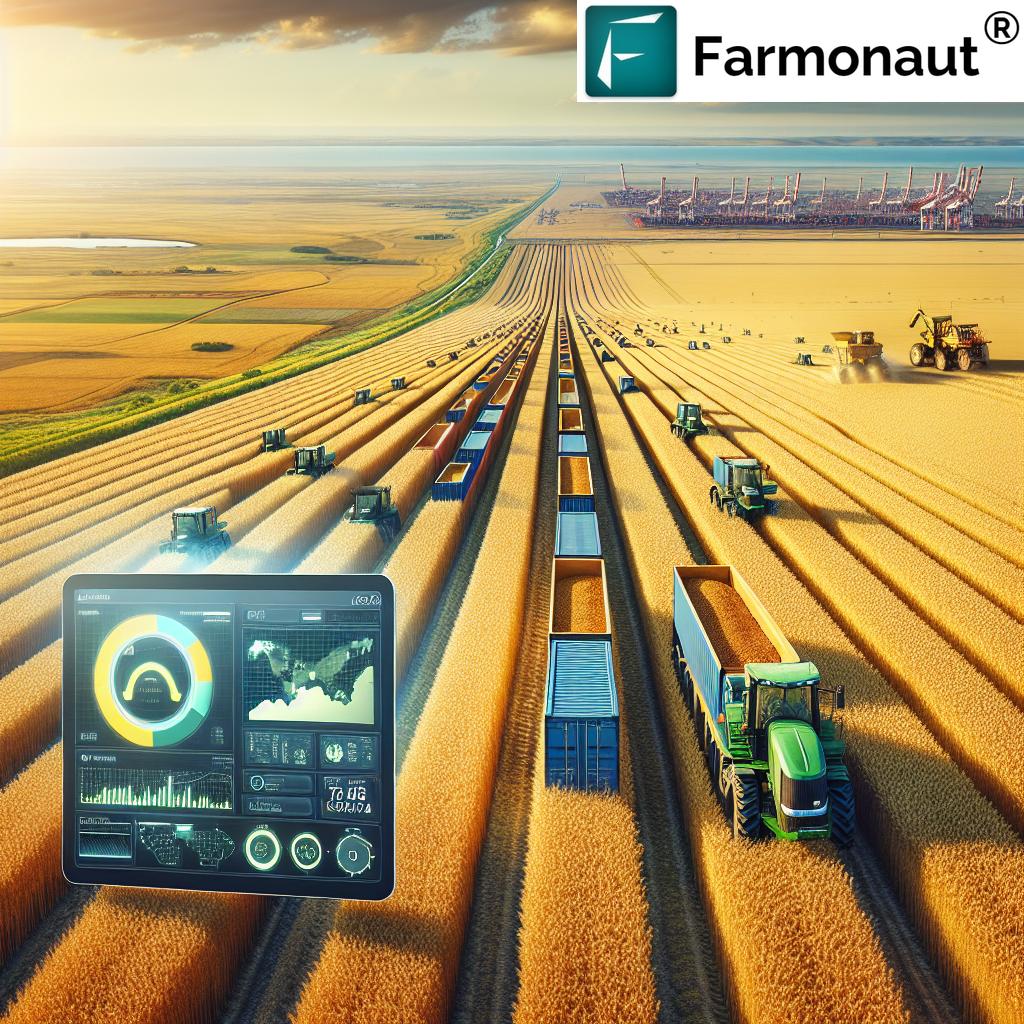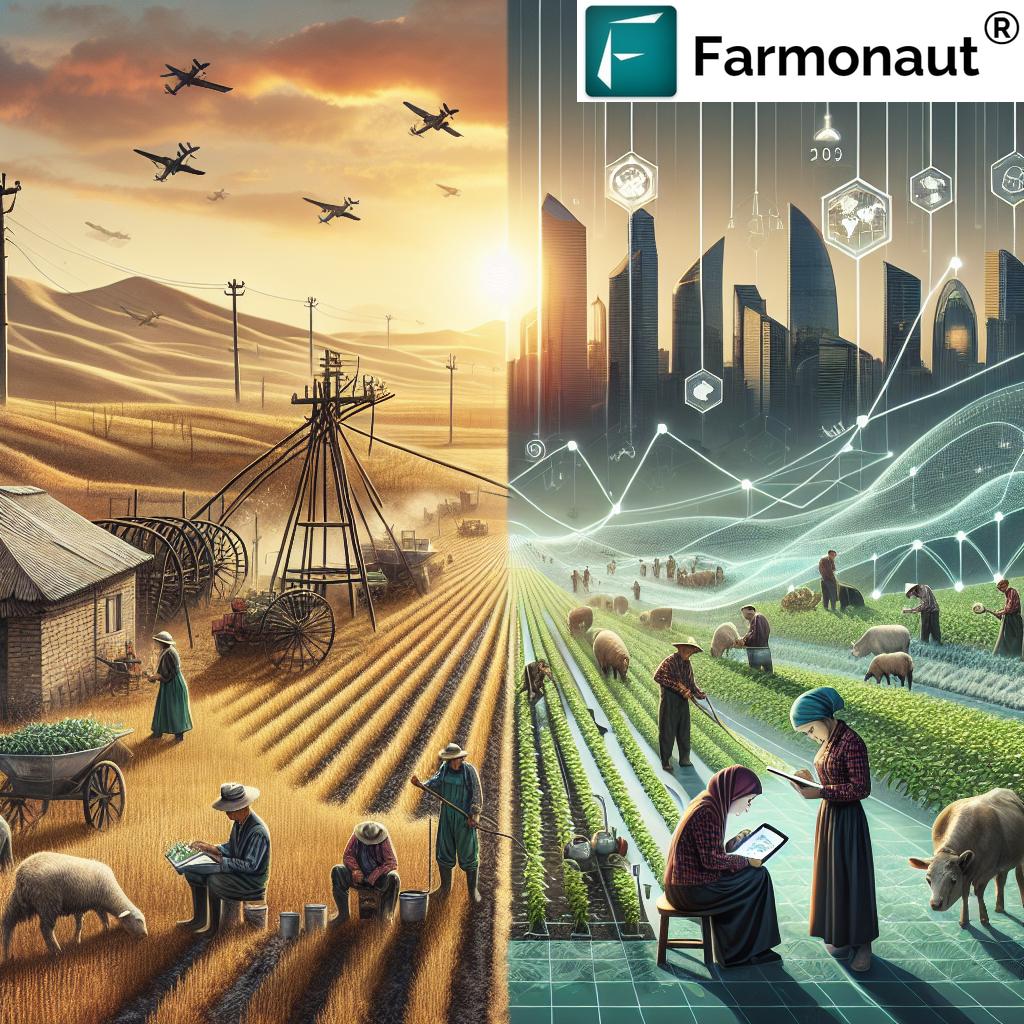Revolutionizing Kazakhstan’s Agriculture: How Precision Farming and Digital Solutions Boost Food Security and Trade Along the Middle Corridor
“Kazakhstan’s strategic location along the Middle Corridor connects over 60 countries across Eurasia for efficient trade.”
In the heart of Central Asia, Kazakhstan is undergoing a remarkable transformation in its agricultural sector, embracing digital farming solutions and precision agriculture technologies to enhance food security and optimize agricultural efficiency. As we delve into this revolution, we’ll explore how Kazakhstan is leveraging its vast arable lands and strategic position along the Middle Corridor to boost international connectivity and reshape the landscape of global trade.
The Digital Agricultural Revolution in Kazakhstan
Kazakhstan, one of the world’s top ten grain exporters, is at the forefront of agricultural innovation in Central Asia. The country’s vast steppes and favorable climate have long made it an agricultural powerhouse, but now, with the integration of cutting-edge technologies, we’re witnessing a new era of farming efficiency and sustainability.
- GPS-guided farm equipment
- Advanced soil monitoring systems
- Satellite-based crop health monitoring
- AI-driven advisory systems
These precision agriculture technologies are not just buzzwords in Kazakhstan; they’re becoming the norm, transforming how farmers manage their crops and resources. Let’s take a closer look at how these innovations are making a difference.
Precision Agriculture: A Game-Changer for Kazakh Farmers
Precision agriculture is revolutionizing farming practices across Kazakhstan’s vast arable lands. By utilizing GPS-guided farm equipment, farmers can now plant, irrigate, and harvest with unprecedented accuracy. This level of precision ensures that every square meter of land is used optimally, reducing waste and increasing yields.
Soil monitoring systems play a crucial role in this new agricultural paradigm. These advanced tools provide real-time data on soil moisture, nutrient levels, and pH, allowing farmers to make informed decisions about irrigation and fertilization. The result? Healthier crops, higher yields, and more sustainable use of resources.

One of the key players in this agricultural transformation is Farmonaut, a company at the forefront of satellite-based farm management solutions. Their platform offers invaluable services such as real-time crop health monitoring and AI-based advisory systems, making precision agriculture accessible and affordable for farmers across Kazakhstan.
To experience the power of satellite-based farming solutions, check out Farmonaut’s offerings:
Digital Farming Solutions: Empowering Kazakh Agriculture
Digital farming solutions are transforming the agricultural landscape in Kazakhstan. These technologies are not just improving efficiency; they’re also addressing critical challenges such as water scarcity and soil degradation.
- Smart irrigation systems
- Drone technology for crop monitoring
- Big data analytics for yield prediction
- Blockchain for supply chain transparency
These innovations are helping Kazakh farmers make data-driven decisions, optimize resource use, and increase their overall productivity. The impact on food security and agricultural exports has been significant, positioning Kazakhstan as a key player in the global food supply chain.
The Middle Corridor: Kazakhstan’s Gateway to Global Trade
Kazakhstan’s strategic location along the Middle Corridor is proving to be a game-changer for international trade. This transport route, connecting China and Europe through Central Asia, is seeing a surge in cargo shipments and trade volume.
Expanding Infrastructure Along the Middle Corridor
To capitalize on its advantageous position, Kazakhstan is investing heavily in expanding its terminal infrastructure along the Middle Corridor. New intermodal cargo terminals are being constructed, and existing facilities are being upgraded to handle increased traffic.
- Expansion of the Aktau and Kuryk ports on the Caspian Sea
- Development of dry ports and logistics centers
- Modernization of railway networks
These infrastructure improvements are crucial for enhancing Kazakhstan’s role as a regional transit hub and facilitating smoother trade flows between Asia and Europe.
Digitalizing Customs Procedures
In a move to further streamline trade along the Middle Corridor, Kazakhstan has implemented the Tez Customs platform. This digital solution is revolutionizing customs procedures, significantly reducing processing times and improving transparency.
Key benefits of the Tez Customs platform include:
- Faster cargo processing
- Reduced paperwork and bureaucracy
- Enhanced transparency and reduced corruption risks
- Improved data collection for trade analytics
By digitalizing customs procedures, Kazakhstan is not only improving efficiency but also positioning itself as a modern, tech-savvy player in the global trade arena.
“Precision farming techniques in Kazakhstan have increased crop yields by up to 30% while reducing water usage by 25%.”
Balancing Economic Growth and Environmental Sustainability
As Kazakhstan pushes forward with its agricultural and trade ambitions, the country is also grappling with significant environmental challenges, particularly in the Caspian Sea region. The balance between economic development and environmental conservation is becoming increasingly crucial.
The Caspian Sea Crisis
The Caspian Sea, the world’s largest inland body of water, is facing an ecological crisis. Water levels are dropping at an alarming rate, threatening local communities and ecosystems. This environmental challenge has sparked a global movement, “Save the Caspian Sea,” highlighting the urgent need for sustainable practices in the region.
- Rapid water level decline
- Threats to unique flora and fauna
- Impact on local fishing communities
- Potential geopolitical tensions over water resources
Kazakhstan, along with other Caspian littoral states, is now tasked with finding innovative solutions to address these environmental concerns while maintaining economic growth.

Sustainable Agricultural Practices
In response to these environmental challenges, Kazakhstan is increasingly turning to sustainable agricultural practices. Precision agriculture and digital farming solutions are playing a crucial role in this shift towards sustainability.
Farmonaut’s satellite-based solutions are at the forefront of this movement, offering tools for:
- Efficient water management
- Reduced chemical usage
- Soil health monitoring
- Carbon footprint tracking
By leveraging these technologies, Kazakh farmers can optimize their resource use, minimize environmental impact, and contribute to the conservation of the Caspian Sea ecosystem.
For developers interested in integrating these sustainable farming solutions, Farmonaut offers comprehensive API services:
Kazakhstan’s Role in Global Food Security
As one of the world’s leading grain exporters, Kazakhstan plays a crucial role in global food security. The country’s adoption of precision farming and digital solutions is not just about improving domestic agriculture; it’s about contributing to the world’s food supply in a sustainable and efficient manner.
Increasing Agricultural Exports
With the implementation of advanced farming techniques, Kazakhstan is seeing a significant increase in its agricultural exports. The country’s strategic location along the Middle Corridor further enhances its ability to supply food to markets in Europe and Asia.
- Expansion of export markets
- Diversification of agricultural products
- Improved quality control through digital solutions
- Enhanced traceability using blockchain technology
These advancements are positioning Kazakhstan as a reliable and efficient source of food for the global market, contributing significantly to food security in many regions.
Collaboration with International Partners
Kazakhstan’s agricultural transformation is not happening in isolation. The country is actively engaging with international partners, including China, to enhance its agricultural capabilities and trade potential.
Key areas of collaboration include:
- Knowledge exchange in precision farming techniques
- Joint research and development projects
- Investment in agricultural infrastructure
- Harmonization of trade standards and procedures
These partnerships are crucial for Kazakhstan’s continued growth in the agricultural sector and its ability to contribute to global food security.
The Future of Agriculture and Trade in Kazakhstan
As we look to the future, it’s clear that Kazakhstan’s agricultural sector is on a trajectory of continued innovation and growth. The integration of digital farming solutions and precision agriculture technologies is set to transform not only the country’s domestic food production but also its role in global trade.
Emerging Technologies in Kazakh Agriculture
The next wave of agricultural innovation in Kazakhstan is likely to include:
- Artificial Intelligence for crop prediction and disease detection
- Internet of Things (IoT) for farm-wide sensor networks
- Vertical farming in urban areas
- Gene editing for climate-resilient crops
These technologies will further enhance Kazakhstan’s agricultural productivity and sustainability, solidifying its position as a leader in modern farming practices.
Strengthening the Middle Corridor
Kazakhstan’s commitment to developing the Middle Corridor is set to continue, with plans for:
- Further expansion of port facilities
- Investment in high-speed rail connections
- Development of smart logistics hubs
- Enhanced digital connectivity along trade routes
These developments will not only benefit Kazakhstan but will also contribute to more efficient and sustainable trade flows across Eurasia.
Kazakhstan’s Agricultural Transformation: Key Metrics and Impacts
| Metric | Pre-Digital Adoption (Estimated) | Post-Digital Adoption (Estimated) | Percentage Change | Impact on Food Security/Trade |
|---|---|---|---|---|
| Crop Yield (tons/hectare) | 2.5 | 3.25 | +30% | Significant increase in food production and export capacity |
| Water Usage Efficiency (%) | 60% | 75% | +25% | More sustainable water use, crucial in water-scarce regions |
| Fertilizer Optimization (%) | 70% | 90% | +28.5% | Reduced environmental impact and production costs |
| Soil Health Index (0-100) | 65 | 80 | +23% | Long-term sustainability of agricultural lands |
| Farm Equipment Productivity (hectares/day) | 50 | 75 | +50% | Increased efficiency in farm operations |
| Export Volume (million tons) | 7 | 10 | +42.8% | Boost in Kazakhstan’s role in global food security |
| Middle Corridor Trade Value ($ billion) | 15 | 25 | +66.7% | Enhanced regional economic integration and trade flows |
Conclusion
Kazakhstan’s agricultural revolution, driven by precision farming and digital solutions, is reshaping the country’s role in global food security and international trade. By leveraging advanced technologies and its strategic position along the Middle Corridor, Kazakhstan is not only boosting its agricultural productivity but also contributing to more efficient and sustainable trade flows across Eurasia.
As we’ve explored, companies like Farmonaut are playing a crucial role in this transformation, providing farmers with the tools and insights they need to optimize their operations and contribute to a more sustainable agricultural future. The integration of satellite-based monitoring, AI-driven advisory systems, and blockchain-based traceability is setting new standards for agricultural efficiency and transparency.
Looking ahead, Kazakhstan’s commitment to balancing economic growth with environmental sustainability, particularly in addressing the challenges facing the Caspian Sea, will be crucial. The country’s efforts to adopt sustainable farming practices and invest in green technologies demonstrate a forward-thinking approach that could serve as a model for other nations.
As Kazakhstan continues to innovate and expand its agricultural capabilities, it is poised to play an increasingly important role in ensuring food security and facilitating trade not just in Central Asia, but on a global scale. The journey of Kazakhstan’s agricultural transformation is far from over, and the world will be watching with keen interest as this Central Asian nation continues to push the boundaries of what’s possible in modern agriculture and international trade.
FAQ Section
Q: How is precision farming changing agriculture in Kazakhstan?
A: Precision farming in Kazakhstan is revolutionizing agriculture by introducing GPS-guided equipment, soil monitoring systems, and satellite-based crop health monitoring. These technologies allow farmers to optimize resource use, increase yields, and reduce environmental impact.
Q: What is the Middle Corridor, and why is it important for Kazakhstan?
A: The Middle Corridor is a trade route connecting China and Europe through Central Asia. It’s crucial for Kazakhstan as it positions the country as a key transit hub, boosting its role in international trade and economic development.
Q: How is Kazakhstan addressing environmental challenges in its agricultural sector?
A: Kazakhstan is adopting sustainable agricultural practices, including precision farming techniques that reduce water usage and chemical inputs. The country is also focusing on addressing the ecological crisis in the Caspian Sea region through conservation efforts and sustainable resource management.
Q: What role does digital technology play in Kazakhstan’s customs procedures?
A: Kazakhstan has implemented the Tez Customs platform, a digital solution that streamlines customs procedures, reduces processing times, and enhances transparency in international trade along the Middle Corridor.
Q: How is Kazakhstan contributing to global food security?
A: As one of the world’s top grain exporters, Kazakhstan is enhancing its agricultural productivity through precision farming and digital solutions. This increased efficiency and output contribute significantly to global food supplies, especially in markets across Europe and Asia.






